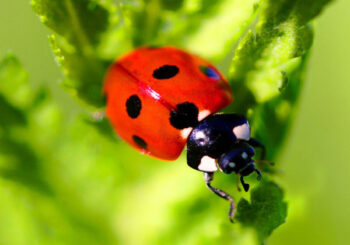By Amelia Harris
Staff Writer for Wake Up World
Not all garden guests are created equal, and when it comes to insects, some are true allies in the quest for a vibrant and thriving garden. At Wake Up World, we believe in fostering a harmonious ecosystem where nature’s helpers play a crucial role in the well-being of your flowers, herbs, and veggies. In this article, we explore the three categories of beneficial bugs—pollinators, predators, and parasitizers—and how to create a welcoming haven for them in your garden.
[pro_ad_display_adzone id=”110028″]
Earthworms – Nature’s Garden Guardians
Earthworms, the unsung heroes of the soil, create a flourishing environment for your plants. By burrowing through the soil, they enhance aeration, create pockets of air, and facilitate nutrient absorption for plants. Their contributions go beyond, as they break down dead plant matter, providing rich nutrients in the form of “worm castings.”
To attract these soil saviors, maintain a diverse, well-mulched garden, and avoid tilling, ensuring a conducive habitat for these beneficial creatures.
Ladybugs – Aphid Assassins
The charming ladybug is not just a pretty face but a voracious predator of aphids, mealybugs, and mites.
Cultivate flat-flowered plants like carrots, fennel, and marigolds to entice these beneficial bugs.
For those who opt to buy ladybugs, a strategic release is key—place the container in the fridge before releasing them near flowering plants or aphid-rich areas at twilight or dawn.
Praying Mantises – Nature’s Silent Guardians
Praying mantises, the guardians of the garden, are formidable aphid, caterpillar, and mosquito hunters. While beneficial, they may also target other helpful insects.
Introduce mantises with egg cases, refrigerating them until warm weather arrives. Hang the container in a shady spot near potential pests, encouraging these silent protectors to stay and thrive.
Green Lacewings – Delicate Predators
With their bright green bodies and delicate wings, lacewings and their larvae are natural predators of aphids, caterpillars, mites, and more.
Attract them naturally by avoiding pesticides and cultivating pollinator-friendly plants that provide nectar and pollen, creating an irresistible haven for these delicate guardians.
Ground Beetles – Nighttime Protectors
Not all beetles are unwelcome, and ground beetles are the nocturnal heroes that feast on pests like slugs, snails, and caterpillars. Mulch the surface to provide a suitable habitat, and let these underground allies overwinter, contributing to a pest-resistant garden.
Soldier Beetles – Pollinators and Pest Predators
Soldier beetles, also known as leatherwings, contribute as both pollinators and pest predators. Their orange and black bodies are misleadingly menacing, but their pollination efforts and predation on grasshopper eggs make them valuable assets. Cultivate flowers with compound blossoms to attract these multitasking allies.
Assassin Bugs – Nature’s Sharpshooters
Assassin bugs, including wheel bugs and ambush bugs, wield a distinctive beak-like mouth to inject venom into pests. Feeding on aphids, caterpillars, and even insects larger than themselves, these sharpshooters are essential allies. While not readily available for purchase, recognizing and preserving their habitat ensures their presence in your garden.
[pro_ad_display_adzone id=”110030″]
Bees – Essential Pollinators
A thriving garden owes much to the buzzing symphony of bees. Provide native flowering plants and allow lawn weeds like clover and dandelion to flourish, offering additional food sources. Create water stations with marbles for hydration, and protect nesting sites for solitary bees, ensuring a pollinator-friendly garden.
Parasitic Wasps – Nature’s Pest Controllers
Tiny yet mighty, parasitic wasps like brachonid and trichogramma wasps play a crucial role in pest control. These non-stinging wasps lay eggs inside harmful insects, providing a natural solution to aphids, caterpillars, and stink bugs. Welcome them by cultivating a garden full of flowering plants that supply the pollen and nectar they seek.
In the realm of gardening, fostering a diverse ecosystem is key to success. Embrace the presence of these beneficial bugs, and let nature’s allies work harmoniously in your garden, creating a haven of flourishing beauty and abundance.
Recommended Reading:
About the author:
Amelia Harris is a writer and eco-activist, interested in health and all things esoteric, with a passion for sharing good news and inspiring stories. She is a staff writer for Wake Up World.
[pro_ad_display_adzone id=”110027″]







